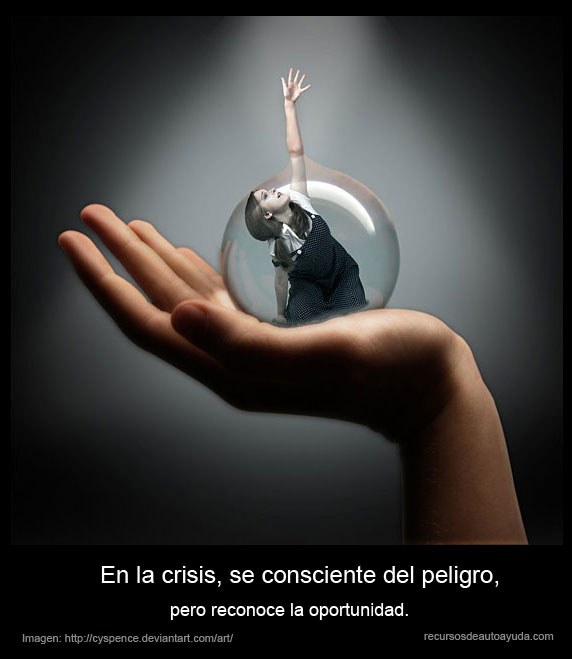KEY IDEAS:
• ASPIRE to be happy, beyond "having" objects and basing ourselves on what we possess.
• To return to CONNECT with a nature that we have been destroying for decades.
• REFLECT about what we really need to be happy, beyond whims, individualisms and rivalries.
• Stop to THINK negatively and basing our lives on money and being more altruistic. Everything is possible if you really put your mind to it.
in time

What are we doing wrong? What future awaits us after four difficult years? Since the dawn of mankind, crises have served as a breeding ground for reflections and opportunities. The change towards happiness begins with oneself.
If the great thinkers of mankind raised their heads In the midst of this (accursed) crisis that Spain is suffering, they would once again pronounce their famous phrases. As much Confucius as Aristotle, Descartes, Shakespeare or Montaigne, among many others, would corroborate that, indeed, humanity has not changed its essence one iota. The economic crisis that we have been going through since 2008 totals 5.639.500 unemployed today, but it represents one more episode among the multitude of potholes that human beings have faced throughout their history.
Only in the twentieth century we have known two world wars, a civil one, periods of bonanza, depression and endless temporary conjunctures. Without going further, at present there are 5 great problems of humanity:
1) world poverty,
2) economic collapse (indebtedness and longevity of people),
3) the depletion of oil,
4) the water crisis and
5) climate change, with the consequent extinction of species.
If for more inri we work more, suffer more stress and enjoy less and less the little things in life, then what are we doing wrong?
CIVILIZATION, IN CHECK
The problem goes far beyond a mere financial question. As Edgar Morin, the philosopher, sociologist, and honorary doctorate from universities around the world pointed out: "We are going through a planetary crisis", in turn economic, social and global. Is about "A crisis of civilization"says this genius of contemporary thought.
Thus, this crisis should serve to change erroneous approaches, customs and principles, experts warn.
(RE) EVALUATE US
From a business point of view, the prestigious international consultancy Society of the Advancement advises not to stand still or wait for opportunitiesBecause precisely those who have carved out a future -even if it is at a slow pace and in the middle of this situation- will be the ones who will later have their reward.
Interestingly, productivity is higher than ever today: fewer workers perform more functions. We live in a volatile, uncertain and complex world, and companies will have to learn to do more with less, to swim amid complexity and to offer creative solutions adapted to the reality of the XNUMXst century.
For the moment, the situation is unsustainable. We overwork (the lucky ones), suffer from stress, and have completely lost our connection with nature. The crisis is therefore a good time to re-evaluate the way we live.
WE HAVE TO REDUCE THE RHYTHM, CUT OUR CONSUMPTION ANSY AND RECOVER THE LOST CONTACT WITH NATURE
Were you really happy at your job? What do you need to be? Are all those quirks really necessary? As an intelligent society, a necessary change is imposed: slow down, cut part of our desire to consume and rediscover our spiritual side.
We work to have a car, buy a bag, own a desired object. They are symptoms that reflect unease, rivalry and competition. In contrast, advertising strives to show perfect couples, calm families and the most satisfied workers. Frustration is then inevitable.
Basic needs are one thing, of course, but we can reflect on what we really need and what we don't.
LIVE: SLOW AND QUALITY
When we speak of compulsive and instantaneous consumerism, we also refer to craving when consuming sentimental relationships, increasingly ephemeral. In addition, we load with commitments and activities our stressed daily schedule against the natural rhythm of things.
However, for a while the call is increasingly being adopted slow life or slow life, in an effort to regain contact with our environment. "Adopt the rhythm of nature: your secret is patience"Ralph Waldo Emerson said.
And the thing is that time is one thing and the quality of that time is another. In times of crisis like this, quality is more important than quantity, that is, you do not need to entertain your friends or family with material gifts. They will appreciate more than share real time with them. Also try to disconnect from your mobile (and TV) for a few hours a day.
Recommended video
«BE» AND NOT «HAVE»
The great challenge, then, is to change the model of the world in which we live, and the current crisis is ideal.
We are witnessing the end of "one" world, and not the end "of" the world. A new citizenship, the social capacity to reinvent ourselves, the world of ideas, the taste for living the little things, governments that promote training and cooperation. All this happens through a regulated economy since the planet we live on allows 3 people to have more income than the 48 poorest countries in the world.
We have created an existence based on the fable of the donkey, the stick and the carrot. The illusion is money, material wealth, social status. Desire is greater than our will; we want to show more of what we have. And this illusion was not infinite. The rules of the game have been tightened and the bubble has burst.
Our aspiration is to recover that "being" and put aside the "having": only then will we live better in our skin and be happier.
Ariane Basaguren for Psychologies
to see if it arrives